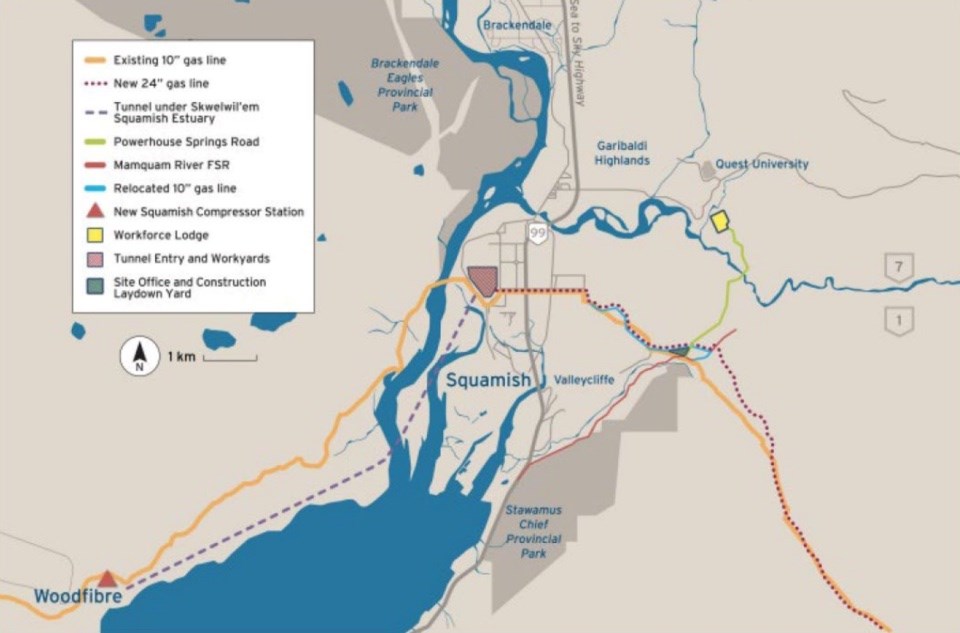The District of Squamish council has voted to receive a letter from FortisBC that provided an update on its activities related to the Eagle Mountain-Woodfibre Natural Gas Project (EGP).
In the letter from FortisBC’s vice president of major projects, Mike Leclair, the company touches on its temporary use permit applications with the District of Squamish (DOS), workforce numbers, accommodation efforts and community safety.
Coun. Eric Andersen pulled the letter at the May 7 council meeting to bring up a few points, saying that the letter addresses many community concerns in a document now on the public record.
“My reason for highlighting or pulling out this item of correspondence is just that simply because there’s been a lot of discussion in this letter which I think is very clear and well-laid out regarding Fortis’ approach to addressing our housing concerns in the community.
“It’s important information and I think it’s important to highlight that we have it, and it’s available,” he said, saying that it addressed a raft of housing concerns, and pointing out that FortisBC was “voluntarily paying the MRDT [hotel tax] to local hotels for remittance to Tourism Squamish - a concern that has come up in conversations around the community.”
Andersen said that the letter was a key plank in putting the company’s efforts out there amid community debate.
“I think that this is important with all the confusion and conversations, that we point to these items of communication that are on the public record.”
According to the letter, FortisBC continues to work through efforts to secure a temporary use permit for its ‘Lodge’ work camp in Squamish, and was due to submit updated plans on May 13 with an eye for a final decision from the DOS by September.
Should FortisBC successfully secure a TUP, the Lodge is expected to take eight months to construct, and was expected to be fully operational by June 2025.
The letter also touches on current workforce numbers, as the company and its subcontractors have been at work since August 2023.
According to the letter, there are currently 190 non-local workers in Squamish associated with FortisBC works, a number that will increase to 270 in summer 2024, and 550 by summer 2025. While the company made a commitment in 2023 to not use local accommodations for its workforce, it later said this wasn’t feasible, and proposed the Lodge to mitigate any impact on local accommodation supply.
As the Lodge would not be ready for 2024, the company said it was taking efforts to reduce impact by seeking more local contractors, and negotiating putting some workers in WLNG’s Floatel – a proposal now on the rocks, given the DOS neither supported or rejected the Floatel at a public hearing in the days before the meeting the letter was discussed. In the interim, the company was paying the MRDT to local hotels in order to sweeten the situation while it took up local accommodation.
Finally, the letter also talked about mitigations for community safety, with Leclair stating the company was “focused on creating a respectful, safe, more diverse, equitable and inclusive project culture” to soothe community concerns, with more detail in the letter itself.
Coun. Chris Pettingill also put up his hand to speak to the letter seemingly in response to Andersen’s assertion that it went a ways to responding to community debate, saying he had not intended to say anything initially but chose to as it was up for discussion.
Citing the WLNG floatel item, Pettingill said that community concerns around accountability of the lead companies and the project's impact on Squamish were front-of-mind, in particular a traffic incident involving a pipeline subcontractor that was not addressed in the letter.
“As we are looking for assurance of accountability with some of the work camp proposals and so on, it’s disappointing not to see that addressed,” he said.
Pettingill went on to say that he had long taken issue with FortisBC’s method of community engagement through ‘community table’ meetings that saw stakeholders take part, saying that the community is not invited.
“I think we’ve seen recently the fate of a proposal that actually hasn’t had sufficient community engagement,” he said about the floatel TUP.
“And when there isn’t that connection and engagement, we end up in a situation where people’s permits and so on don’t get supported, and so I would really caution Fortis to think about ‘community table’ - what that really means and what they need in terms of engagement and listening to the community if they want success in what they’re asking for.”
No other councillors spoke to the letter.




